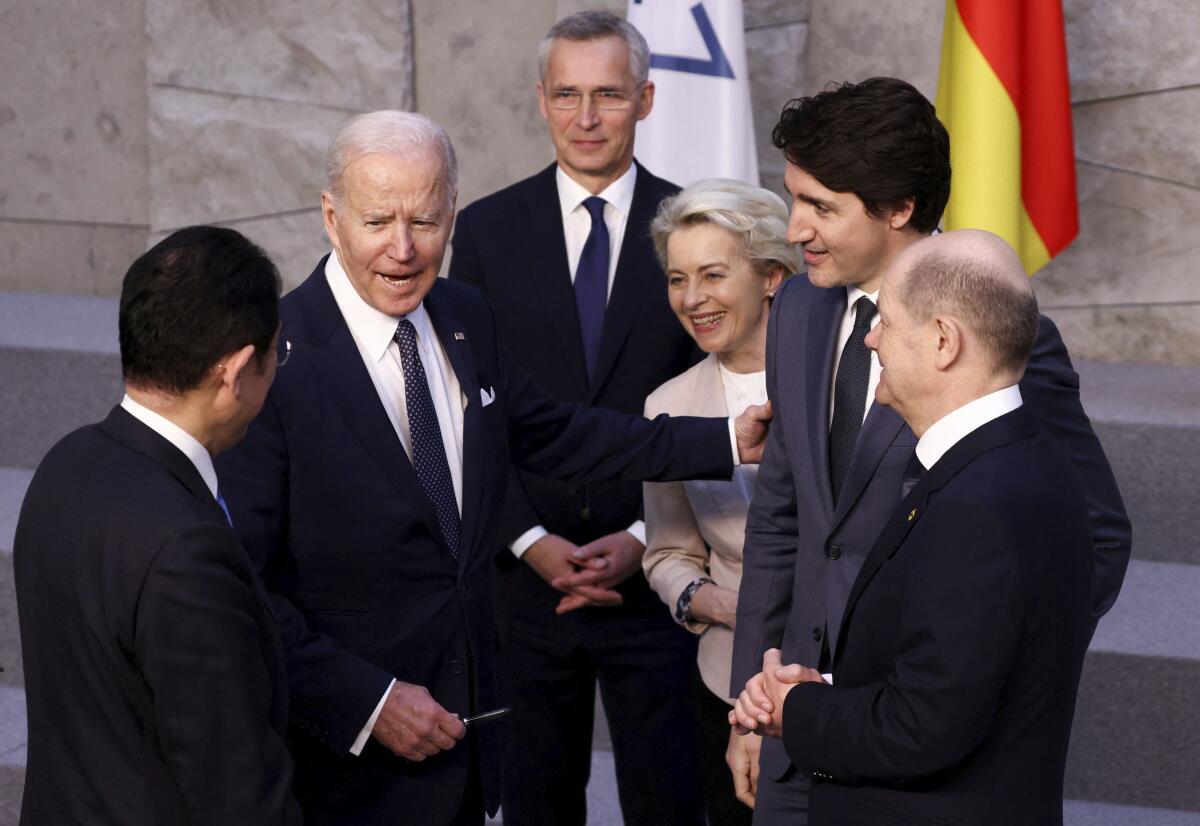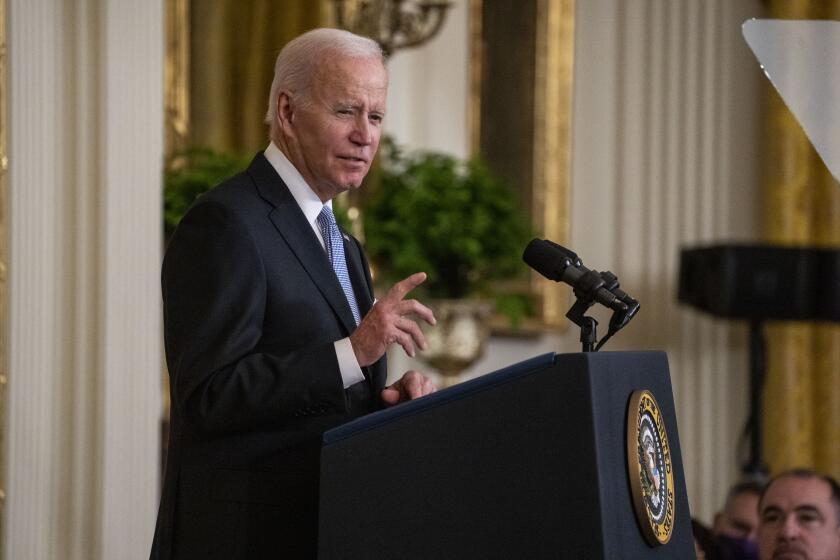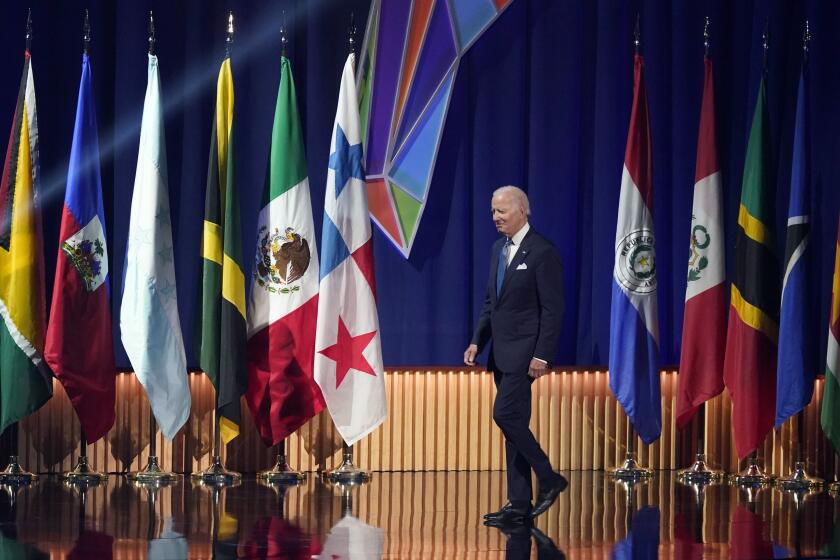News Analysis: Russia has unified NATO. But Biden, G-7 allies face mounting challenges

- Share via
KRÜN, Germany — When President Biden returns to Europe this weekend for six days of economic and national security meetings, he’ll do so as the leader of reinvigorated Western alliances, resolute in responding to Russia’s invasion of Ukraine and recommitted to defending democracy.
But he will also arrive as a fundamentally weaker political figure than he was a year ago. Bogged down at home by frustrations over inflation, the president is bracing for November elections that could see Republicans take control of Congress.
And he is hardly alone among the leaders of the world’s preeminent democracies, all of whom are strenuously navigating the economic and political shock waves from the protracted conflict in Ukraine while also facing domestic pressures that could imperil their broader collective ambitions.
Biden’s primary goal in Europe last year was to show allies that “America was back,” that he was a more stable and reliable partner than his predecessor, former President Trump. But heading into this year’s G-7 and NATO summits that start Sunday, Biden, still the de facto leader of these alliances, will be under pressure to push for initiatives that have tangible benefits for U.S. voters — and leery of pushing too hard on long-range objectives that could risk further destabilizing an economy on the verge of recession.
“When Biden looks like he’s taking it on the chin at home, he’s constrained abroad,” said Ian Bremmer, president of the Eurasia Group, a global risk assessment firm based in New York. “He has to be more focused now on ‘what can I bring back?’ than ‘what I can I show the world?’ That’s a harder position for an American president to be in.”
Biden attended his first summits of the Group of 7 and North Atlantic Treaty Organization as president a year ago this month, determined to fulfill the United States’ historical role as the central pillar of a transatlantic alliance united around shared democratic values.
In Cornwall, England, where the G-7 met, Biden and the leaders of the world’s leading industrialized economies rolled out major initiatives to help fund a global COVID-19 vaccination program and to launch an infrastructure bank to offer developing countries a financing alternative to China’s $4-trillion Belt and Road Initiative.
Also hoping to stabilize relations with Russia, Biden capped that trip by meeting with President Vladimir Putin in Geneva for three hours of talks. Roughly eight months later, Putin invaded Ukraine, miscalculating that his forces would quickly overtake Kyiv and that the U.S. and Europe would not react by imposing severe economic sanctions and arming Ukraine to the hilt.
The leaders of the G-7 will start a round of meetings Sunday in the Bavarian Alps with a clear focus on the still-uncertain fate of a country less than 700 miles to the east.
“This is a crisis G-7. You can’t approach this like you approached the last one,” said Bremmer. “There is an active crisis going on and the G-7 is leading the response. The Americans in particular have shown extraordinary leadership to build a strong and durable coalition to respond to the biggest direct challenge to the global order we’ve seen in decades.”
But the war will likely relegate other priorities to the back burner. G-7 leaders plan to relaunch the infrastructure bank, initially dubbed “Build Back Better World” after Biden’s now-derailed domestic spending program, as the Partnership for Global Infrastructure. But given inflation, it’s unlikely the U.S. or any other G-7 country will commit to significantly funding the initiative, seeking instead to harness contributions from the private sector.
And it’s not clear how seriously they’ll try to ratchet up sanctions against Moscow, given the economic pain already being felt across the globe tied to the war. The invasion has disrupted supply chains, Western sanctions have roiled energy markets, and Putin’s blockade of Ukrainian grain exports has set the stage for higher food prices and a potential worldwide food crisis.
The G-7 has thus far been just as tepid in addressing food insecurity, which has exploded due to the pandemic and war in Ukraine. Member nations have said it’s a top priority and created a commission to study the situation — but they have refused to say how much money they’re ready to put behind initiatives aimed at aiding farmers and keeping food markets open.
President Biden assured voters his experience and competency would stabilize the country. But his White House has struggled to manage multiple crises from an infant formula shortage to inflation.
G-7 leaders face another conundrum in countering China’s rise as the world’s dominant economic power. Any action that seeks to curtail China’s trading or spending power could lead to higher inflation. With inflation already at record levels in the U.S. and rising in other G-7 and NATO countries, democratic leaders would be wise to proceed with caution, analysts say.
“This is not the time to really turn the screws in a fundamental way against China,” said Ivo Daalder, president of the Chicago Council on Global Affairs, who said the G-7 is likely mainly to restate its expectations for Beijing to abide by clear economic norms and rules. “Nobody wants to accelerate any economic confrontation with China when inflation is at 7-8%.”
Yet failing to confront China also carries risks. President Xi Jinping has aligned his nation with Russia in the fight over Ukraine while at the same time making increasingly belligerent moves toward Taiwan, the island that claims independence but that China considers its own.
Senior administration officials said that the decision to invite several Indo-Pacific countries — Japan, South Korea, Australia and New Zealand — to the NATO summit that convenes in Madrid starting Wednesday shows continued attention to the China threat. NATO plans to codify that threat by including, for the first time, Beijing as a potential adversary in its main strategic planning document, administration officials said.
The NATO summit was originally planned with a focus on migration and other issues of high importance to southern Europe. But Ukraine has changed that. The meetings will instead center on adopting the organization’s first new strategic concept in 12 years, one that reflects the new reality of an aggressive, adversarial Russia. That strategic plan will also for the first time include China as a potential adversary, administration officials said.
“NATO is going sort of back to somewhat of a Cold War posture in terms of needing to reinforce front-line states that border Russia, just as NATO did during the Soviet period,” said Leah Scheunemann, a former undersecretary of Defense policy related to NATO.
Putin’s Feb. 24 invasion was an immediate wake-up call for Europe. Finland and Sweden, after decades of strategic neutrality, moved quickly to join NATO. Their membership, held up for now by objections from Turkey, likely won’t be resolved over the two days of meetings but is considered an eventual certainty.
Additionally, nations like Germany that have long resisted pressure to boost defense spending recognized Russia as a real danger and have ramped up funding their militaries. Finding the resources to follow through on those commitments, while also sending weapons and ammunition to Ukraine, has proved challenging due to rising costs — especially at a moment when European nations are trying to wean themselves off Russian oil and gas.
“These conundrums for Western countries are real,” said Constanze Stelzenmuller, a Germany expert at the Brookings Institution, a Washington think tank. “The economics ministry is really racing to decouple Germany from Russian fossil fuel imports, but there is a real risk of that causing a massive recession.”
As Ukraine has hunkered down into a brutal conflict in the country’s eastern region that could last for months or even years, its military demands have grown. Ukrainian President Volodymyr Zelensky continues to push the West for more advanced artillery, which is more expensive and in limited supply.
But Europeans “don’t have big inventories, so essentially when they start cutting or giving away systems, they are kind of cutting in the bone,” said Max Bergmann, the director of the Europe Program at the Center for Strategic and International Studies.
From before his invasion of Ukraine, Putin planned to exploit what he was confident would become fissures in transatlantic unity. While he has failed so far, his intentions remain firm and potentially achievable, analysts say.
“It’s always been a geopolitical objective of Vladimir Putin to drive a wedge between the United States and Europe and to drive wedges amongst and between EU member states,” said John Emerson, a former U.S. ambassador to Germany and current chair of the American Council on Germany, a nonpartisan group promoting U.S.-German ties.
While allies have rallied around Ukraine, President Biden’s broader foreign policy mission has delivered symbolism and summitry but little progress.
While Russia’s autocracy leaves Putin largely impervious to shifts in public sentiment, Western leaders are increasingly vulnerable as they absorb the shocks of the war, caught between public frustrations over inflation and public pressure to do even more to aid Ukraine.
European leaders are battling internal political turmoil, and some have seen their popularity dip and governing coalitions collapse amid economic concerns and fallout from the invasion.
Biden, beset by a low approval rating and a rough economy, faces a difficult task in limiting Democratic losses in the November midterms.
Amid rumblings from his own party about whether he’s too old to seek a second term in 2024, Biden is under intense pressure to show he can tame inflation and address America’s political polarization. And the Supreme Court’s seismic decision Friday overturning Roe vs. Wade has further roiled domestic politics, and could make it harder for Biden to proselytize about democracy on the world stage as individual rights are eroding at home.
Although these leaders may recalibrate some aspects of their agenda next week in response to their current struggles, they are expected to affirm their overarching commitments — to Ukraine, to one another and the fundamental principles that bind them.
“Every country faces stresses and strains. The important point for the leaders to emphasize is that we’re all in this together,” said Daalder, who served as U.S. ambassador to NATO under President Obama.
“The only way we will succeed is for allies to stick together and overcome the short-term problems of inflation and energy independence [from Russia] so we can win the longer-term battle.”
More to Read
Get the L.A. Times Politics newsletter
Deeply reported insights into legislation, politics and policy from Sacramento, Washington and beyond. In your inbox three times per week.
You may occasionally receive promotional content from the Los Angeles Times.














